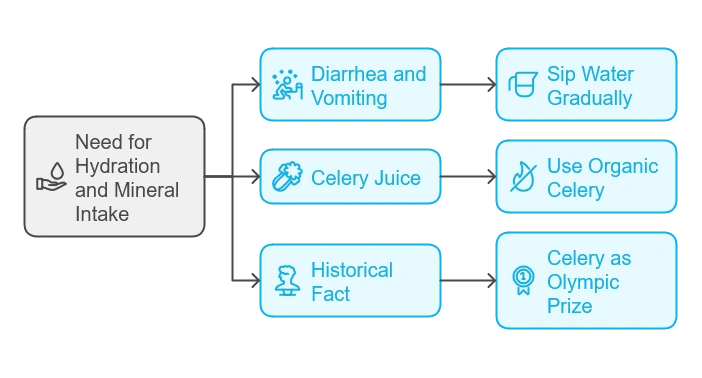Dehydration is a critical condition that occurs when the body loses more fluids than it takes in. Recognizing the signs, understanding the causes, and knowing effective strategies to combat dehydration are essential for maintaining overall health. This guide consolidates information from various sources to provide a thorough overview of dehydration.

Signs of Dehydration
Dehydration can manifest in numerous ways, categorized into minor and severe symptoms.
Minor Dehydration
- Dry mouth
- Swollen tongue
- Low urine output
- Deep yellow-colored urine
- Thirst
- Sweaty palms
- Headaches (often relieved by drinking water)
Note: Minor dehydration is often confused with hunger.
Severe Dehydration
- Weakness
- Seizures
- Chest or abdominal pains
- Fainting
- Dizziness
- Confusion
- Decreased sweating or inability to sweat
- Sluggishness
- Difficulty breathing
- Weight loss
When to Seek Professional Help
- Body temperature exceeds 100°F (37.8°C)
- Seizures
- Chest or abdominal pains
- Difficulty breathing
- Dizziness
- No urination in a 10-hour period
Medical Check: Professionals check vital signs such as heart rate, blood pressure, and breathing to determine the degree of dehydration. A simple test involves taking the pulse and blood pressure while the person is lying or seated and then standing for about a minute. Normally, the heart rate speeds up and returns to normal. If it does not, it indicates dehydration, which can lead to dizziness and fainting.
Causes of Dehydration
Dehydration occurs due to an imbalance in fluid intake and loss. Several factors contribute to this condition:
- Daily Water Loss: The body loses about three liters of water daily through sweat, urine, stool, and breath.
- Diuretic Beverages: Coffee, tea, sodas, and alcohol remove water from the body. For every cup of coffee consumed, two to five cups of water are needed to rehydrate, depending on the type of coffee and added sugars or cream.
Importance of Hydration
Hydration is vital for the body’s functions and metabolic processes:
- Blood Composition: The blood is mainly water.
- Organ Function: Organs, including the brain (80% water), need water to function.
- Cellular Health: Cells reside in fluid made up of mainly water.
- Asthma and Dehydration: Dehydration can cause adult asthma due to cell shrinkage and inflammation, leading to difficulty in breathing.
Fact: Some respiratory therapists have reportedly treated asthma attacks with only water.
Combating Dehydration
Effective strategies to combat dehydration include:

Hydration Tips
- Drink Water: Avoid soda, coffee, and alcohol. Use a straw for those with mouth sores or jaw injuries. Make it a treat for kids using juicy fruits like watermelon, pineapple juice, or celery.
- Small Sips: Take small sips of water every 8 to 15 minutes to avoid overwhelming the bladder and kidneys.
- Electrolyte Replacement: Use Electrolyte Replacement Drink Mix during heavy sweating or extreme heat exhaustion.
Natural Remedies
- Celery and Pineapple Juice: Cool the body, fight pain and inflammation, and replace mineral salts.
- Celery and Gelatin: A high sodium and protein cocktail that eliminates thirst and is great for joints.
- Black Cherry or Pomegranate Juice: Mixed with equal parts water, helps the body retain moisture.
- Celery and Cucumber: A high sodium and silicon cocktail that cools the body.
- Licorice: Chew on its sweet roots or take capsules to combat thirst.
- Potassium: Helps balance bodily fluids and support kidney function.
- Alpha Lipoic Acid: Regenerates antioxidants and increases energy flow to the brain and muscles.
- Cellular Energy: Energizes the body at the cellular level.
- HY-C: A Chinese formula with herbs like Schizandra, Licorice, and asparagus to fight thirst and symptoms associated with fluid loss.
Professional Help
- Seek professional help for chronic dehydration, as it could indicate a more serious condition.
- Contact an herbalist for additional suggestions.
Summary Table
| Category | Details |
|---|---|
| Minor Dehydration | Dry mouth, swollen tongue, low urine output, deep yellow-colored urine, thirst, sweaty palms, headaches |
| Severe Dehydration | Weakness, seizures, chest or abdominal pains, fainting, dizziness, confusion, decreased sweating, sluggishness, difficulty breathing, weight loss |
| When to Seek Help | Body temperature exceeds 100°F, seizures, chest or abdominal pains, difficulty breathing, dizziness, no urination in a 10-hour period |
| Causes | Daily water loss, diuretic beverages |
| Hydration Tips | Drink water, small sips, electrolyte replacement |
| Natural Remedies | Celery and pineapple juice, celery and gelatin, black cherry or pomegranate juice, celery and cucumber, licorice, potassium, Alpha Lipoic Acid, Cellular Energy, HY-C |
| Professional Help | Chronic dehydration, contact an herbalist |
Additional Hydration Tips

- Diarrhea and Vomiting: Often, people reduce water intake during diarrhea. However, the body loses a lot of water in loose stool and needs replacement. Take small sips of water at intervals.
- Celery Juice: An excellent source of mineral salts lost in perspiration. Ensure to use organic celery due to its high treatment with chemicals.
- Historical Fact: In early Olympic games, celery was awarded as the winner’s prize for rejuvenating athletes after strenuous events.
Dehydration is a serious condition that can lead to severe health issues if not addressed promptly. By understanding the signs, causes, and effective strategies to combat dehydration, you can maintain optimal health and well-being.